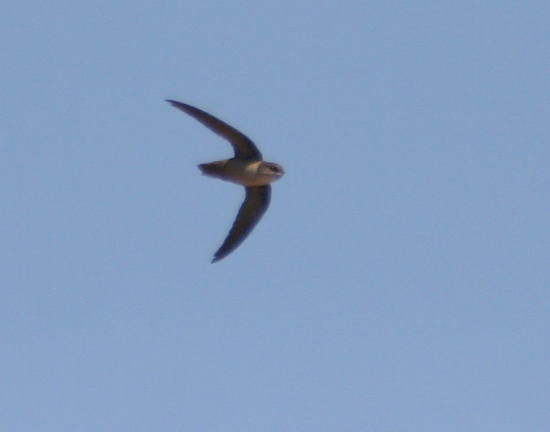| Line 1: | Line 1: | ||
| − | {incomplete}} | + | {{incomplete}} |
| − | [[Image:060716 Vaux's Swift 5276.jpg|thumb|550px|right|Photo by Glen Tepke<br />Santa Cruz, California, USA, 16 July 2006]] | + | [[Image:060716 Vaux's Swift 5276.jpg|thumb|550px|right|Photo by Glen Tepke<br />Santa Cruz, [[California]], USA, 16 July 2006]] |
;[[:Category:Chaetura|Chaetura]] vauxi | ;[[:Category:Chaetura|Chaetura]] vauxi | ||
==Identification== | ==Identification== | ||
| Line 14: | Line 14: | ||
==Behaviour== | ==Behaviour== | ||
| − | The cup shaped nest is built from twigs and saliva and placed in a tree hole or cliff crevice. 3 white eggs are laid. | + | * '''Breeding:''' The cup shaped nest is built from twigs and saliva and placed in a tree hole or cliff crevice. 3 white eggs are laid. |
| − | + | *''' Diet:''' Includes flying insects, such as beetles, wasps, termites and flying ants. | |
==References== | ==References== | ||
#{{Ref-Clements6thDec08}} | #{{Ref-Clements6thDec08}} | ||
Revision as of 15:40, 27 December 2009
| This article is incomplete. This article is missing one or more sections. You can help the BirdForum Opus by expanding it. |
- Chaetura vauxi
Identification
10.7 to 11.2 cm. Dusky black head, upperparts and wings are dusky black, grey brown underparts, rump and tail coverts, paler grey throat, becoming whitish in northern birds. The sexes are similar, but juveniles have dusky bases to the throat feathers.
Distribution
Southern Alaska to central California, Mexico, Panama and northern Venezuela.
Taxonomy
Five subspecies are recognized:[1]
Habitat
Mountains and foothills, mainly above 700 m, forests and towns.
Behaviour
- Breeding: The cup shaped nest is built from twigs and saliva and placed in a tree hole or cliff crevice. 3 white eggs are laid.
- Diet: Includes flying insects, such as beetles, wasps, termites and flying ants.
References
- Clements, JF. 2008. The Clements Checklist of Birds of the World. 6th ed., with updates to December 2008. Ithaca: Cornell Univ. Press. ISBN 978-0801445019.




